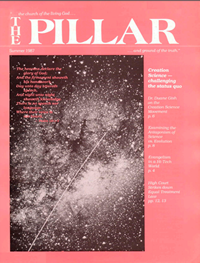Bible Science... |
Religion vs. Science? |
By Thomas F. HawkinsSource: The Pillar Magazine - Summer 1987 |

|
Since the beginning of recorded history, men have had insatiable appetites for knowledge. Questions like the following have been asked for thousands of years:
The dictionary definition of religion is "a cause, principle, or belief held to with faith and ardor." If any cause, principle or belief if held in spite of sound evidence to the contrary, then it is a false religion. Upon investigation, the answer which have come from these false religions can be quickly discarded as baseless myths. One key characteristic of false religion is that major false premises and false doctrines are set forth as true, and from that point on, all data is examined in the light of the original false premise. Evidence is modified or discarded to suit the all-powerful original premise instead of building the premise on a foundation of evidence. On the other hand, truth Bible-based religion and true science have definitions which are remarkably similar. The dictionary definition of science is "a branch of study concerned with observation and classification of facts and especially with the establishment of verifiable general laws." A particularly relevant biblical definition of true religious faith can be found in Hebrews 11:1: "Now faith is the substance of things hoped for, the evidence of things not seen." Both true religion and true science are concerned with verifiable, substantive facts which are evidences of things which cannot be seen. Scientists have learned a great deal about the atom by observing phenomena cause by atoms without ever having seen one. Likewise we trust the biblical account of creation because we have verifiable evidences that the Bible has been totally inerrant in stating hundreds of other historical events both as historical record and as prophecy, yet none of these events has been seen by anyone living today. The fact is, true religion and true science must be not only similar but actually of the same essence. The same God that spoke the universe into existence also conceived, designed, built, and sustains the atom. Religion and science, having the same author, must then be one complete inseparable body of universal truth! The question then is, "Where does the theory of evolution fall?" Is it a systematized collection of verifiable facts which lead to an indisputable conclusion? Or is it an idea formulated on the basis of very little data and supported by questionable evidence gathered by men who are prejudicially committed to evolution as a religion? Take the time to examine and weigh the evidence, and then you be the judge. Christians should not be afraid of science. Creation vs. evolution is not a debate between religion and science but rather a conflict wherein universal truth, comprised of both divine revelation and of science, stands against a collection of unsupported assumptions -- just another in a long line of false religions. |